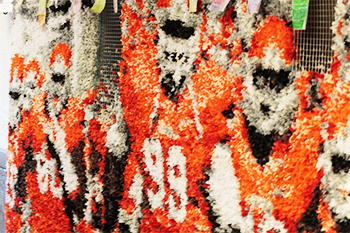Take-Home Message: Whatever it is, stand for your brand.
Writer’s Note: This post was inspired from an entrepreneurship e-course. The following is a quote from this text:
“everything you put out there in the world needs to clearly stand for something. Because when you stand for something, others can stand with you. But when you hesitate; when you try to appeal to as many people as possible with your message, your business offerings, your services, your products, your website, your copy, your blog posts, your social media updates…you cockblock people from being able to decide if you’re for them, or not. And if they can’t tell, the answer will always be no.” –Ash Ambirge, You Don’t Need A Job, You Need Guts
Have you ever met a real-life metamorphagus? In muggle-speak, the closest thing I can equate this to is a chameleon or shape-shifter. The type of person to whom I’m referring is the one who will, in the matter of one conversation, effectively change his or her mind about any matter so as to appease you or the audience. I think this is not only intellectually dishonest, but I think it’s lazy.
I’ve always been puzzled by it. I understand the incentive structure of it, I think. People want to be well-liked, so they project a false image of themselves onto others. Or, they might not even know it’s a false image. They simply project whichever image they think would satisfy their interlocutor. The short-term gains of doing this seem to be more inviting than the long-term gains of standing their ground on issues and potentially risking the loss of a friendship or offending a new acquaintance. It’s an interesting strategy, I think. However, I propose operating by a different one.
I’m more of a believer in the words of Dewey Cox: “Walk Hard.” You’re going to encounter people with whom you disagree. In fact, you might even meet people who resent you for disagreeing with the way they see the world. When that happens, I think you’ve gotta take it in the face and walk as hard as you can. At least, I believe if you want to be true to yourself this is how you should operate.
In fact, I think we detract value from the world–where we otherwise could have created value–by seeking only to appease others. When we delicately tiptoe within the boundary lines of allowable opinion, we are not doing anyone any favors. More importantly, though, I think we miss out on meaningful conversations and opportunities to learn about how someone else experiences the world differently than us. That information is invaluable.
Now, I do not think the goal should be to offend others. There are definitely some methods to go about sharing your beliefs and ideas that are more harmful and less well-received than others. However, this does not mean you should be afraid to.
You should also dismiss and banish from your mind’s eye myths like “political correctness.” In a world of politics, anything disagreeable to the government is heresy. For instance, when I was in college, I once heard an administrator give a speech on hazing. They defined it as “Anything that makes someone uncomfortable is hazing.” How shameful. I think that’s some bullshit attempt at creating a society of victims.
If something offends you, maybe you should broaden your horizons. If you’ve offended someone, then maybe you’ve done them some good. I know that when I interact with someone who offends me by their beliefs they stick in the back of my mind more than someone who attempts to appease me. It sits there and dwells, and I chew on it like cud.
And what ends up happening as I replay those conversations in my head is that I stumble upon some nugget of truth either about that person or their beliefs that I previously didn’t know. They taught me something, even if it wasn’t some grand philosophical truth, their defense of their beliefs gave me something I didn’t before have. In so doing, they showed me into their head and revealed to me not only what they believe to be true, but also, they showed me how my beliefs are being received.
The latter part is the more important part to me. It’s another valuable reason for having conversations without fear of offending others: it allows us to sharpen and refine our own beliefs, our own conversations skills, and our ability to persuade and argue effectively. It makes us think critically and it makes us face some oftentimes harsh realities about the ways others are perceiving us. Next time you offend someone, keep this in mind: they might have done you a favor; they gave you a free signal that you’re either shitty at selling your ideas or they’re too narrow-minded for you to want them to be your friend.
However, that’s not always the case. Sometimes people get so caught up in their ideas of what’s unacceptable table talk that they refuse to even participate or grant you an audience. Well, a huge fuck you to them too for being so obtuse. Those are the type of people with whom I wish I could go back in time and watch a George Carlin show live. I would piss my pants laughing at how uncomfortable it made them to be exposed to ideas that conflicted with their shallow worldview.
And here’s why: I think the essence of learning involves bringing new knowledge into our heads. New knowledge always accomplishes one or more of a handful of tasks. It reaffirms what we already know, it disproves what we thought we knew, or it blows our minds by introducing something we’ve never before encountered.
That means every transaction of learning involves bringing something into our mind that was not previously there. If we are always walking around being so damned easily offended by new information or hyper-sensitive to knowledge that contradicts our current views and beliefs, then we’re equivalently anesthetizing ourselves to knowledge.
And so we’ve come full-circle back to the shape-shifters and chameleons, because that’s exactly what I think seeking to appease people does. It’s like condemning a whole generation to go without books, or like putting your brain inside a jar of fluid and placing it on a shelf to collect dust. You’re wasting opportunities to participate in one of the most beautiful miracles we as human beings can possibly partake in: experiential learning. And for what, to save face?
Here are some hard facts about life:
- The people who actually love you will get over it. Whatever it is, if they’re really worth having in your life, they will not hate you for your ideas or beliefs, nor patronize you to the point you can’t stand it.
- The people who don’t matter will remove themselves from your life. They’re all sweethearts like that. If they can’t get over your ideas or beliefs, they’ll hit the road, Jack.
- What you say about your character isn’t necessarily voiced by what you believe, so much as is said by how you believe it and how you defend it when challenged. If you’re abandoning your beliefs because of the way other people make you feel, then you probably never really believed it.
- Get tough. The world is full of non-believers in your ideas.
So, next time you find yourself cornered at a bar with the greasy dude who wants to impress you with how much you guys have in common, throw him a curve-ball. Make him dance by bringing up something you believe to be true that you know he won’t. And then just watch. I dare you.
You’re not hurting your brand by offending others. Others are hurting your brand by keeping you afraid of being yourself. Don’t let your brand be that of a coward or a shmoozer. If anything, be labeled an extremist. Embrace your ideas, beliefs, and the facts you know to be true, and go out into the world boldly, unafraid, and eager to learn and face whatever comes your way.








